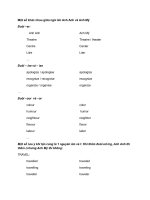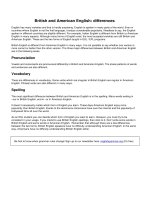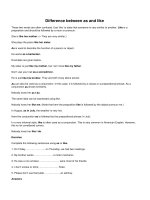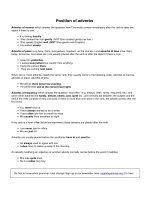Position of adverbs difference between british and american english
Bạn đang xem bản rút gọn của tài liệu. Xem và tải ngay bản đầy đủ của tài liệu tại đây (13.11 KB, 1 trang )
Position of adverbs: difference between British and American
English
Mid-position adverbs usually go after auxiliary verbs, after am / are / is / was / were and before other verbs.
She has never written to me.
The discussion was mainly about politics.
When there are two or more auxiliary verbs, the adverb usually goes after the first.
You have definitely been working hard.
In American English, mid-position adverbs are often put before auxiliary verbs and am / are / is / was / were,
even when the verb is not emphasized.
You certainly have made him angry. (US)
You have certainly made him angry. (GB)
You are always late. (GB)
You always are late. (US)
America has long been known as a land of opportunities. (GB)
America long has been known as a land of opportunities. (US)
In British English, mid-position adverbs can go before auxiliary verbs and am / are / is / was / were when we want
to emphasize the auxiliary verbs.
I am really sorry. (No emphasis on am.)
I really AM sorry. (Emphasis on AM)
In negative sentences, mid-position adverbs generally come before not if they emphasize the negative.
Compare:
I really don’t like her. (Strong dislike)
I don’t really like her. (Mild dislike)
Stay on top of your writing! Download our grammar guide from www.englishgrammar.org to stay up-to-date.
Powered by TCPDF (www.tcpdf.org)









